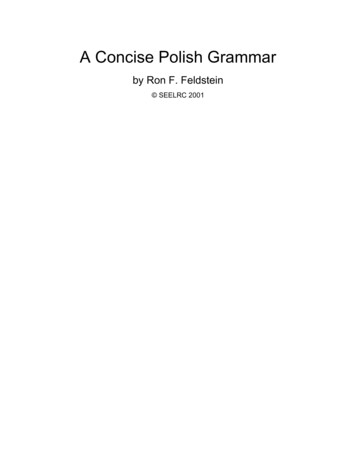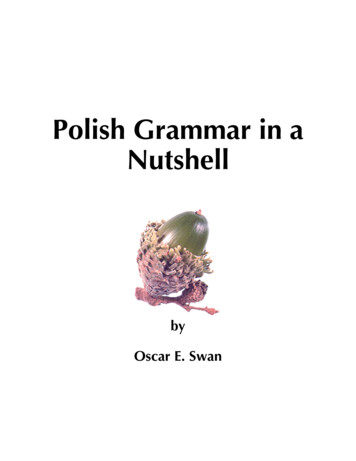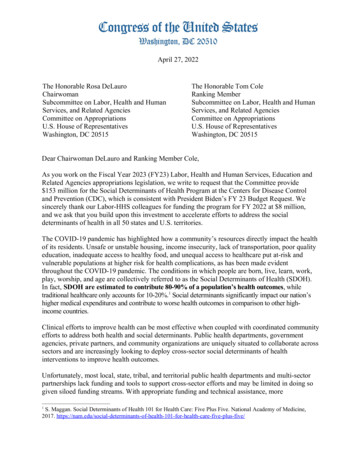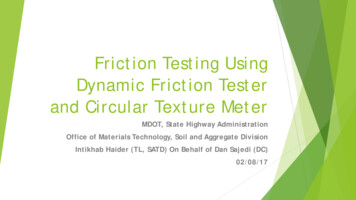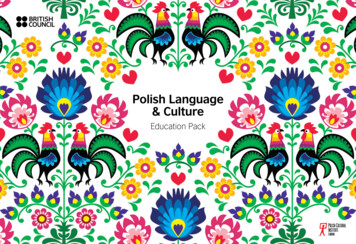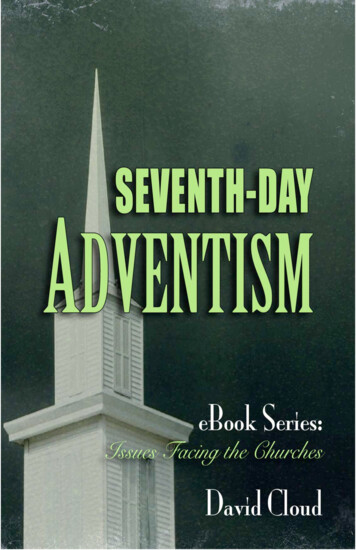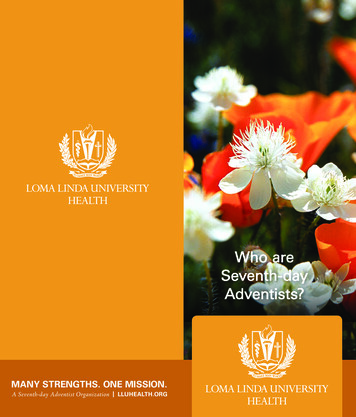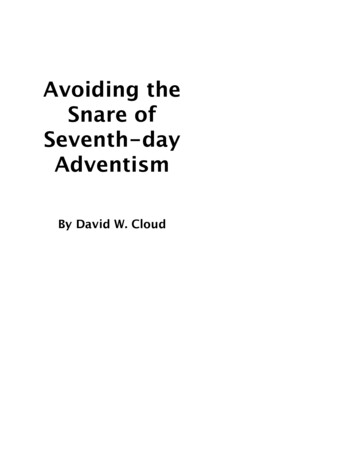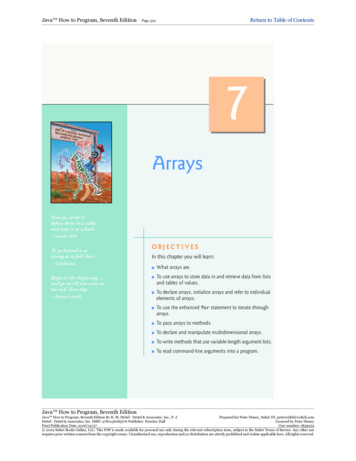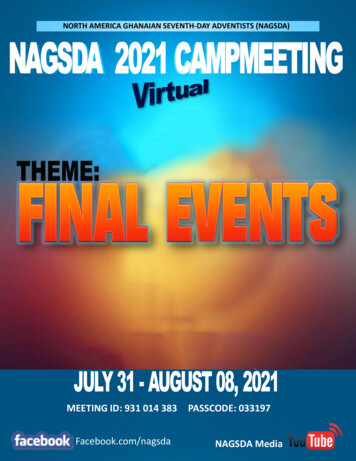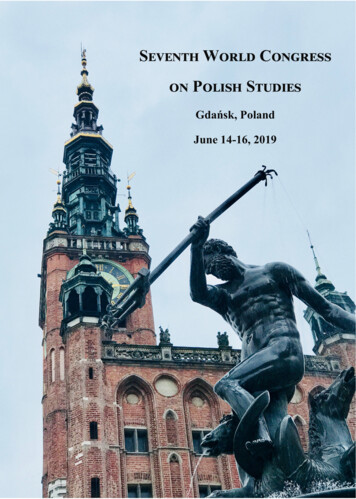
Transcription
Seventh World Congresson Polish StudiesGdańsk, PolandJune 14-16, 2019
Welcome to theSeventh World Congresson Polish StudiesUnder the Honorary Patronage ofRector of the University of Gdańsk Jerzy Piotr GwizdałaMayor of Gdańsk Aleksandra DulkiewiczMayor of Gdynia Wojciech SzczurekCongress Organizing CommitteeRobert Blobaum, PresidentPolish Institute of Arts & Sciences of AmericaProgram ChairJames S. PulaPurdue University NorthwestLocal Arrangements ChairAnna MazurkiewiczUniversity of GdańskCommittee MembersArkadiusz Janicki (University of Gdańsk) Bożena Leven (The College of New Jersey) Beata Możejko (University of Gdańsk) Magdalena Nowak (University of Gdańsk) Neal Pease (University of Wisconsin-Milwaukee) Przemysław Różański (University ofGdańsk) Renata Vickrey (Central Connecticut State University)
OrganizersPIASACo-OrganizersSupported by a Grant from .Partners
Gdańsk Przymorze – UniwersytetTrain StationFaculty of HistoryBuildingFaculty of History Building ul. Wita Stwosza 55Go to Room 2.8 for the following ― Conference Information / Sign InConference SecretaryInternet AccessLost and Found
4The Conference at a Glance — numbers refer to the session numbers in the program.
5
THURSDAY, June 139:00-17:00 (9:00 am-5:00 pm) – Optional Malbork Trip. Busleaves promptly at 9:00 from the front of the Faculty ofHistory building, University of Gdańsk, ul. WitaStwosza 55. (Prior Reservation Required)19:00 (7:00 pm): Board of Directors Meeting of the PolishInstitute of Arts & Sciences of America (Open to Boardmembers only — University of Gdańsk, Faculty of History, Room 1.48, ul. Wita Stwosza 55).FRIDAY, June 14Faculty of History building, University of Gdańsk, ul. Wita Stwosza 55the Cold War”; Frederick J. Augustyn, Jr. (U.S. Libraryof Congress), “Cold War Colloquy—the ‘Kitchen Debate’of July 1959—Regional Perspectives and InternationalImplications”8:00-9:00: Polish Institute of Arts & Sciences Business Meeting— Chair: Robert Blobaum (West Virginia University)9:00-9:30: Conference Opening Welcome (Room 1.43)Co-Chairs: Anna Mazurkiewicz (University of Gdańsk);James S. Pula (Purdue University Northwest)Speakers: Piotr Stepnowski (Vice-Rector for Research andForeign Cooperation, University of Gdańsk); WiesławDługokęcki (Dean of the Faculty of History, Universityof Gdańsk); Robert Blobaum (President, Polish Institute of Arts & Sciences of America, University of WestVirginia)9:30-10:30: Plenary Session (Room 1.43) — The Importanceof Anniversaries and Commemorations — Chair: RobertBlobaum (West Virginia University) — Presenters: JanKubik (Rutgers University, US, and University CollegeLondon, UK); Dariusz Stola (Polish Academy of Sciences)10:30-10:45: Break (Main Hall, Gr ound Floor )(refreshments are provided for registered participants only)10:45-12:15: Concurrent Sessions1. The PIASA Distinguished Achievement Award: Roundtablein Honor of Jan Kubik (Room 1.47) — Chair: RobertBlobaum (West Virginia University) — Presenters:Michael Bernhard (University of Florida); MichałŁuczewski (University of Warsaw); Zdzisław Mach(Jagiellonian University, Kraków); Comment, Jan Kubik(Rutgers University and University College London)2. Visions of Ethnicity and Culture (Room 2.3) — Chair: PienVersteegh (Independent Scholar) — Presenters: MarkJantzen (Bethel College), “Becoming German, BecomingPolish: The Diverging Paths of the Mennonite Communities of Former Russian and Austrian Poland in the SecondPolish Republic”; Kris Van Heuckelom (University ofLeuven), “Performing Polishness Abroad: (Non-PolishActors and the Construction of (Trans)National Identitiesin European Cinema (1918-2018)”; Józef Figa (SouthernNew Hampshire University), “Wojciech Korfanty and HisVision of Silesia in Poland”3. International Relations During the Cold War (Room 2.6) —Chair: Jakub Tyszkiewicz (University of Wrocław) — Presenters: Jan Lencznarowicz (Jagiellonian University, Kraków), “Polish-Australian Relations at the Time of Solidarność and the Martial Law in Poland”; Nameeta Mathur(Saginaw Valley State University), “On the Front Line ofFriendship: Poland’s Diplomatic Mission in India During4. NOTE: Because of a scheduling conflict, Session 4 wasmoved to 9:00 Sunday, June 16. Please see Session 63A onpage 12 for information.5. Literary Migrations: From Poland to Polonia (Room 1.48)— Chair: Grażyna J. Kozaczka (Cazenovia College) —Presenters: Jolanta Wrobel-Best (University of Houston),“Why Did Plato Exclude Poets from the State? InvisibleCities, Philosophy, and the Hidden Metaphysics in theWritings of Adam Zagajewski”; Thomas Napierkowski(University of Colorado-Colorado Springs), “Then CameHeaven: LaVyrle Spencer’s Portrait of Polonia”; GrażynaJ. Kozaczka (Cazenovia College),“World War II Politicsand the Evolution of Romain Gary’s Polish Agenda in HisNovels, Forest of Anger and A European Education”6. Futures in the Present: Polish Printmaking and the Questfor Democracy in the 1960s (Room 1.46) — Chair: EndiPoskovic (University of Michigan) — Presenters: EndiPoskovic (University of Michigan), “Polish Printmakingand the Quest for Democracy in the 1960s”; AleksandraJanik (Eugeniusz Geppert Academy of Art and Design,Wrocław), “The Wrocław School of Printmaking and Current Tendencies and Present-day Strategies in Polish Printmaking”; Charlotte Biszewski (Eugeniusz Geppert Academy of Art and Design, Wrocław), “Embedded in Print:Analogue Storytelling in the Digital Age”7. Remembering the Holocaust (Room 1.45) — Chair: RachelF. Brenner (University of Wisconsin-Madison) — Presenters: Przemysław Różański (University of Gdańsk),“Polish-Jewish Relations During the Holocaust: What theAmerican Archives Tell Us”; Liviu Carare (U.S. Holocaust Memorial Museum), “Holocaust Memory in Romania. Traian Popovici and the Rescue of Jews in Czernowitz”8. Polskie mniejszości – przeszłość i teraźniejszość [Session inPolish] (Room 2.61) — Przewodnicząca: Anna Łysiak(University of Gdańsk) — Referenci: Marcin R. Odelski(Instytut Kaszubski, Gdańsk), “Znaczenie zwyczaju Ścinania kani/Scynanié kanie na Kaszubach. Przeszłość iteraźniejszość. Wybrane zagadnienia”; Eugeniusz Pryczkowski (Rada Języka Kaszubskiego), “Kaszubska diasporaw Kanadzie”; Tadeusz Stegner (University of Gdańsk)“Kresy polsko-ewangelickie na konferencji pokojowej wParyżu, 1919”6
FRIDAY, June 14Faculty of History building, University of Gdańsk, ul. Wita Stwosza 5512:15-13:45 (12:15-1:45 pm): Lunch (Main Hall,Ground Floor) Provided for registered participants only.13:45-15:15 (1:45-3:15 pm): Concurrent Sessions9. Commemorating the 225th Anniversary of the Kościuszko Insurrection (Room 1.46) — Chair: Adam Koniuszewski (TheBridge Foundation) — Presenters: Arkadiusz Janicki(University of Gdańsk), “The Attitudes of the Courland Nobles Toward the Kościuszko Uprising, 1794”; Anna Rosner(Jewish Historical Institute), “Berek Joselewicz”; James S.Pula (Purdue University Northwest), “Tadeusz KościuszkoPrevents a War”10. Gombrowicz in Transnational Context Fifty Years After HisDeath – 1 (Room 1.48) — Chair: Piotr Seweryn Rosół(Université Clermont Auvergne, France), — Presenters:Olaf Kühl (Advisor to the Mayor, Berlin, Germany),“Translating the Secret”; Silvia G. Dapía (John Jay College, City University of New York), “The Cow Stares at Us:Issues of Vulnerability and Precariousness in Gombrowicz”;Jerzy Jarzębski (Jagiellonian University, Kraków), “ThePolitical Gombrowicz”11. Americans in Poland, 1918-1947 (Room 2.6) — Chair:Stephen Leahy (Shantou University, China) — Presenters:Norman Kelker (Enzo Biochem, Inc.), “Herbert Hoover,the Man Who Fed Poland”; Jan-Roman Potocki(Independent Scholar), “Americans in Poland 1919-1947:Revisiting Herbert Hoover’s Legacy”; Vivian Reed(Independent Scholar), “A Month in the Life of a Diplomat:Hugh Gibson, June 1919”12. Economics. Politics, Society in Contemporary Poland –TheAnnual Michael Sendzimir Session (Room 2.3) — Chair:Bożena Leven (The College of New Jersey) — Presenters:Jan Napoleon Saykiewicz (Duquesne University), “Polandand the EU – The Case of Joy and Space of Discomfort”;Anna Dziadkiewicz (University of Gdańsk), “Trends inTourist’s Travel Patterns in the Baltic Sea Region”;Krzysztof Bledowski (Manufacturers Alliance for Productivity and Innovation), “Productivity and Wages: Whencethe Divergence and What Are the Policy Choices?”13. Herstory in Poland: Memory, Transgression, Performance(Room 2.7) — Chair: Anna Mazurkiewicz (University ofGdańsk) — Presenters: Dobrochna Kałwa (University ofWarsaw), “Women’s Fight for Their Rights: Herstory andWomen’s History in Poland in the Centenary of Suffrage”;Anna Müller (University of Michigan-Dearborn),“Soldiers, Conspirators, and Prisoners: Are the Polish Female Political Prisoners a Good Example of Transgression?”; Justyna Beinek (University of Kansas), “Womenand Protest: Bio-art of Cecylia Malik”14. 450th Anniversary of the Union of Lublin (Room 1.47) —Chair: Beata Możejko (University of Gdańsk) — Presenters:Tomasz Kempa (Mikołaj Kopernik University, Toruń),“The Attitude of Ruthenian Magnates and Nobles Towardthe Union of Lublin”; Paul Knoll (University of SouthernCalifornia, emeritus), “Before Krewo/Krėva: PolishLithuanian Relations in the Late Piast Era”; SobiesławSzybkowski (University of Gdańsk), “In Defense of Neophytes: The Nobility of the Kingdom of Poland TowardLithuania 1389-1398”15. Dimensions of Emigration. Research Activity of the Emigration Museum in Gdynia (Room 1.45) — Chair: AgataBeata Domachowska (Mikołaj Kopernik University,Toruń) — Presenters: Agnieszka Kowalkowska(Emigration Museum in Gdynia), “Dimensions of Emigration. The Marine Station in Gdynia 1933-2019”;Katarzyna A. Morawska (Emigration Museum in Gdynia), “The Mobility of Highly Skilled Migrants”; RafałRaczyński (Emigration Museum in Gdynia), “RelationsAmong the States of Origin and the Diaspora in the Context of Transfer of Knowledge, Skills and Know-how”16. Kazimierz Wierzyński: w pięćdziesiątą rocznicę śmierci(1894-1969) [Session in Polish] (Room 2.61) — Przewodnicząca: Beata Dorosz (Polish Academy of Sciences,Warsaw) — Referenci: Marek Kusiba (Polish-CanadianPublishing Fund, Mississauga, Canada), “Adresy Kazimierza Wierzyńskiego”; Beata Dorosz (Polish Academy ofSciences, Warsaw), “Kobiety w życiu KazimierzaWierzyńskiego”; Konrad Niciński (Polish Academy ofSciences, Warsaw), “Kazimierz Wierzyński na igrzyskachw Amsterdamie. Poeta, dziennikarz, olimpijczyk”; PawełRams (Polish Academy of Sciences, Warsaw),“Korespondencja Kazimierza Wierzyńskiego i JanaLechonia – edycja cyfrowa”15:15-15:30 (3:15-3:30 pm) Break (Main Hall, Gr oundFloor; refreshments provided for registered participants only.)15:30-17:00 (3:30-5:00 pm): Concurrent Sessions17. Studies in Film (Room 1.46) — Chair: Barbara Klassa(University of Gdańsk) — Presenters: AleksandraGruzinska (Arizona State University), “From Drama andNovel to Film: Rediscovering Feminist Transgressions inthe Discovery of Radium in Les Palmes de MonsieurSchutz”; Marek Haltof (Northern Michigan University),“Revisiting Krzysztof Kieślowski’s European Art Films:The Double Life of Véronique (1991) and Three ColorsTrilogy (1993/1994)”; Wacław Osadnik (University ofAlberta), “Ida’s Testaments”18. Polish Diaspora Studies: Young Scholars, New Topics(Room 2.6) — Chair: Dorota Praszałowicz (JagiellonianUniversity, Kraków) — Presenters: Sylwia KuźmaMarkowska (University of Warsaw), “Family, Home, andBeyond: Polish Immigrant Women in Chicago (1890s1930s)”; Gabriela Gałecka (University of Gdańsk),“Social Life and Culture of the Polish Community in Paraguay”; Aleksandra Kurowska-Susdorf (Polish NavalAcademy), “A Transformational Journey of CanadianKashubs for Tourism Pedagogy”19. Illustrious Kraków Burials (Room 2.3) — Chair: Patrice M.Dabrowski (Harvard Ukrainian Research Institute) —Presenters: Petro Nungovitch (King Abdullah Academy),“On the 150th Anniversary of the Discovery of KingKazimierz the Great’s Remains Inside the Wawel Cathedral”; Patrice M. Dabrowski (Harvard Ukrainian Research Institute), “’Equal to the Kings’? (Re)viewing theFirst Wawel Burial of the Interwar Period”; KathrinKrogner-Kornalik (University of Munich), “‘He Will BeFine in This Grave’: Józef Ignacy Kraszewski’s Burial inKraków’s Crypt of the Distinguished”7
FRIDAY, June 14Faculty of History building, University of Gdańsk, ul. Wita Stwosza 5520. Gombrowicz in Transnational Context Fifty Years After HisDeath – 2 (Room 1.48) — Chair: Silvia G. Dapía (John JayCollege, City University of New York) — Presenters: PiotrSeweryn Rosół (Université Clermont Auvergne, France),“Forget Gombrowicz”; Błażej Warkocki (Adam MickiewiczUniversity, Poznań), “What Really Happened Aboard theBanbury? Reading Gombrowicz with Eve Kosofsky Sedgwick”21. New Perspectives on Medieval Polish History in Honor ofPaul Knoll (Recipient of the 2018 Oskar Halecki Award)(Room 1.47) — Chair: Lynn Lubamersky (Boise State University) — Presenters: Paul Radzilowski (Madonna University), “Jan Długosz’s Life of St. Kunegunda as a Source for HisReligiosity”; Roman Ivashko (Lviv National University ofIvan Franko), “The Basel-Florentine Vicissitudes in the LvivLatin Metropolitanate: the Review”; Anna Adamska(University of Utrecht), “Approaching Late Medieval (14thCentury) Polish History”; Discussant, Paul Knoll (Universityof Southern California, emeritus)22. Promoting Ethnic Identity in North America (Room 2.7) —Chair: Thomas Napierkowski (University of ColoradoColorado Springs) — Presenters: Magdalena Blackmore(University of Manitoba), “‘One Beautiful Family’: InventingNew Ethnic Identity Through an Organization. A Case Studyof the Polish Gymnastic Association Sokol in Winnipeg”;Renata Vickrey (Central Connecticut State University), BenTyson (Central Connecticut State University), VivianaNicholas (Central Connecticut State University),“Strategies for Promoting Polish Identity in the Northeastern United States”; John Radzilowski (University of Alaska Southeast), “Beatae memoriae: Commemoration andIdentity in American Polonia”23. The Museum as a Commemorative Project (Room 1.45) —Chair: Alan Lockwood (Independent Scholar) — Presenters: Robert Kostro (Polish History Museum), “MuzeumHistorii Polski: Our Concept and Achievements”; AnnaKalinowska (Polish History Museum), “What Can a Museum Do for Academia? MHP and the Support of Historical Research”; Discussant, Alan Lockwood (IndependentScholar).24. Współczesna recepcja polskiego romantyzmu [Session inPolish] (Room 2.61) — Przewodnicząca: Maria Kalinowska (Uniwersytet Warszawski) — Referenci: RomanKoropeckyj (University of California, Los Angeles) andBoris Dralyuk (Los Angeles Review of Books),“Nauczanie romantyzmu z Adamem Mickiewiczem”;Maria Kalinowska (Uniwersytet Warszawski),“Mickiewicz i romantycy polscy we współczesnej recepcji”; Marcin Leszczyński (Uniwersytet Warszawski),“Recepcja polskiego i angielskiego romantyzmu wpracach Stanisława Brzozowskiego w kontekścienowoczesności”18:00-20:00 (6:00-8:00 pm)Welcome Reception and Tour of theEmigration Museumul. Polska 1, GdyniaFree admission and refreshments courtesyof the Emigration Museum.NOTE: Open only to those registered forthe conference.8
SATURDAY, June 15Faculty of History building, University of Gdańsk, ul. Wita Stwosza 559:00-10:30: Concurrent Sessions25. The United States and Poland: the Road to 1989 (Room1.45) — Chair: Anna Mazurkiewicz (University of Gdańsk)— Presenters: Jakub Tyszkiewicz (University of Wrocław),“U.S. Policy Toward Poland During the Reagan Administration”; Joanna Wojdon (University of Wrocław),“Polish Americans and the Democratic Changes in Polandin the late 1980’s”; Paulina Wojciechowska (Seton HallUniversity), “Reagan and Solidarność: How the SolidarityMovement Influenced United States Policies”; JacekTebinka (University of Gdańsk), Discussant26. The Casimir Funk Natural Sciences Award: The Achievements of 2018 Recipient Krzysztof Palczewski (Room 1.47)— Chair: Hanna Kelker (New York University MedicalCenter) — Presenters: Maciej Wojtkowski (Polish Academy of Sciences); Katarzyna Komar (Mikołaj KopernikUniversity, Toruń); Wiesław Palczewski (School of Management "Edukacja" in Wrocław); Comment, KrzysztofPalczewski (University of California, Irvine School ofMedicine)27. Polish and European Historical Memory (Room 1.46) —Chair: Christopher Garbowski (Marie Curie-SkłodowskaUniversity, Lublin) — Presenters: Christopher Garbowski(Marie Curie-Skłodowska University), “The Polish Debateon the House of European History in Brussels”; JanHudzik (Marie Curie-Skłodowska University), “A Comparative Study of Polish and German Historical Policy”; LynnLubamersky (Boise State University), “From Partisan Resister to War Criminal: Three Women and the Memory ofthe Holocaust in Lithuania”28. Polish Culture: Unconventional Approaches (Room 2.3) —Chair: Magdalena Blackmore (University of Manitoba) —Presenters: David James Jackson (Bowling Green StateUniversity), “Preserving Heritage Through North AmericanEthnic Festivals”; Annefleur Schep (Amsterdam University of the Arts), “Copying Malinowski: UnconventionalMethodology in Researching Polish Culture”; PiotrSzczypa (Marie Curie-Skłodowska University), “PolishVideo Games as Carriers of Polish Culture”29. Patterns of Polish Migration and Community Building(Room 1.48) — Chair: Anna Fiń (Pedagogical University,Kraków) — Presenters: Aneta Kostrzewa (York College,City University of New York), “From Ethnic to Global:Gentrification and Polish Immigrants in Changing Brooklyn Neighborhoods: The Case of Greenpoint”; Pien Versteegh (Independent Scholar), “Mobility Patterns of PolishMigrants in the U.S. 1900-1940: A Comparison BetweenChicago and Wilkes-Barre, Pennsylvania”; Marcin Gońda(University of Łódź), “‘Either We Defend Our Polishness orThere Will Be No Polonia.’ Practices of Negotiating National Identity Among the Polish Diaspora in Cleveland”30. Commemorating the 240th Anniversary of Kościuszko’sWork at West Point (Room 2.7) — Chair: Piotr Derengowski (University of Gdańsk) — Presenters: HughMcMahon (Independent Scholar), “Kościuszko & Jefferson: An Enduring Friendship”; Anthony Bajdek(Northeastern University, retired), “On the 212th Anniversary of Joel Barlow’s Columbiad, A Perspective onKościuszko’s Role at Saratoga”; Michał Burczak(University of Warsaw), “Poland’s 1946 Celebration of the200th Anniversary of Kościuszko’s Birth”31. Wojny i konflikty w świecie bałtyckim [Session in Polish](Room 2.6) — Przewodnicząca: Beata Możejko (Universityof Gdańsk) — Referenci: Adam Lubocki (University ofGdańsk), “Walki polsko-pomorskie w XI w. w świetlekronik węgierskich”; Mateusz Szuba (University ofGdańsk), “Data i przebieg podboju Pomorza Wschodniegoprzez Bolesława Krzywoustego”; Mariusz Bizewski(University of Gdańsk), “Wydarzenia roku 1259 i ichwpływ na kierunki polityki królowej Danii MałgorzatySamborówny”32. Przestrzenie emigracji 1 [Session in Polish] (2.61) — Przewodniczący: Wojciech Ligęza (Jagiellonian University,Kraków) — Referenci: Marian Kisiel (University of Silesia,Katowice), “Jan Bielatowicz. Portret krytyka”; Anna Jamrozek-Sowa (University of Rzeszów), “‘Złożyć ze sobą różne kawałki obrazu’. Konstruowanie przestrzeni w tekstachliterackich Evy Hoffman”; Justyna Budzik (JagiellonianUniversity, Kraków), “Ojczyzny artystyczne ElżbietyWittlin-Lipton”10:30-10:45: Break (Main Hall, Gr ound Floor ;refreshments are provided for registered participants only.)10:45-12:15: Concurrent Sessions33. The 2018 Wacław Lednicki Humanties Award Roundtable:Ewa Hryniewicz-Yarbrough’s Objects of Affection (Room1.47) — Chair: Jan Lencznarowicz (Jagiellonian University, Kraków) — Presenters: Rachel F. Brenner (University ofWisconsin-Madison); Katarzyna Jerzak (Akademia Pomorska, Słupsk); Donata Blobaum (West Virginia University); Ewa Hryniewicz-Yarbrough (Boston and Kraków)34. Polish Traits in Foreign Intelligence Units (Room 1.48) —Chair: Sławomir Łukasiewicz (John Paul II Catholic University of Lublin) — Presenters: Jacek Tebinka (Universityof Gdańsk), “Special Operations Executive – Polish Section”; Jakub Tyszkiewicz (University of Wrocław), “MajorStefan Szymanowski the Head of the OSS School of Specialists and the Eagle Project (1944-1945)”; Anna Mazurkiewicz (University of Gdańsk), “Polish Operations Withinthe Foreign Division M of the CIA, 1952”35. Echoes of Poland and the American Revolution (Room 1.45)— Chair: Lidia Paulinska (International Federation ofJournalists) — Presenters: Marian Hillar (Texas SouthernUniversity), “The Polish Contribution to the Idea of theFirst Amendment to the U.S. Constitution”; Christopher N.Fritsch (Mountain View College), “Poland in the Minds ofthe American Founders”; Michał Krzysztof Mydłowski(University of Warsaw), “George Washington in the Eyes ofJulian Ursyn Niemcewicz”36. Commemorating Polish Anniversaries (Room 1.46) —Chair: Marcin Szerle (Gdynia City Museum) — Presenters:Elizabeth Clark (West Texas A&M University), “The Power of Nine: Memory Culture and Commemoration of — 9Anniversaries in Gdańsk”; Anna Topolska (Adam Mickiewicz University, Poznań), “Memory and Visuality: Representations of the Second World War in Poznań, Poland inthe 20th and 21st Centuries”9
SATURDAY, June 15Faculty of History building, University of Gdańsk, ul. Wita Stwosza 5537. “From the Suburb to the Centre ” Central-European Intellectuals and Late Imperial Russia (Room 2.3) — Chair: WimCoudenys (University of Leuven) — Presenters: WimCoudenys (University of Leuven), “A Life in ‘Opposition’ toRussia? The Case of Ferdynand Ossendowski”; VladislavaWarditz (Universität Potsdam), “When Linguistics BecomePolitics: Baudouin de Courtenay as a Linguist and Politicianin the Russian Empire”; Petra James (Université Libre deBruxelles), “Travel to Russia (1896): Vilém Mrštík’s (18631912) Trip to the Russian Empire”38. Philosophers and Historians (Room 2.6) — Chair: BeataHalicka (Adam Mickiewicz University, Poznań) — Presenters: Anna Sosnowska (University of Warsaw), “ExplainingEconomic Backwardness and Political Marginalization.Oskar Halecki versus Marian Małowist on East (Central)Europe”; Ryszard Zajączkowski (John Paul II CatholicUniversity of Lublin), “Bolesław Miciński Philosopher andWriter”; Łukasz Chełmiński (The Graduate Center, CityUniversity of New York), “Leszek Kołakowski: Between Exile and Emigration”42. At the Center of Foreign Policy Thinking: ZbigniewBrzeziński and the World He Helped Shape (Room 1.48)— Chair: Rafał Raczyński (Emigration Museum in Gdynia) — Presenters: Patrick Vaughan (Jagiellonian University, Kraków), “The Real Revolution: ZbigniewBrzeziński and the Legacy of the 1960s”; WojciechMichnik (Jesuit University Ignatianum), “The Pragmatist? Perceptions of Zbigniew Brzeziński’s IntellectualLegacy in Poland”; Donald Pienkos (University of Wisconsin-Milwaukee), “Justin Vaisse’s View of Brzeziński’sThinking on Eastern Europe and the Soviet Union: AComment”43. The Significance of 1989 (Room 1.46) — Chair – AnnaMazurkiewicz (University of Gdańsk) — Presenters:Magdalena Lesińska (University of Warsaw), “The Engagement of the Polish Diaspora in the 1989 Elections”;Mary Patrice Erdmans (Case Western Reserve University), “The Influence of the Events of 1989 on SolidarityRefugees’ Decision to Return”; Jane Curry (Santa ClaraUniversity), “The Reaction of the American Media to1989”39. Of Authors, Novels, and Observations (Room 2.7) — Chair:Grażyna J. Kozaczka (Cazevovia College) — Presenters:Francesco Costantini (Jagiellonian University, Kraków),“For the Strengthening of Hearts! H. Sienkiewicz and W. B.Yeats: Two Unusual Parallel Literary Destinies”; SoniaCaputa (University of Silesia, Katowice), “Polish AmericanFoodways and Ethnic Cross Dressing in Karolina Wacławiak’s California Novel How to Get into the Twin Palms”;Ania Hyman (American University), “The Bikini Boy Ponders the Reconstruction: The Postwar Rebuilding of WarsawThrough the Eyes of Leopold Tyrmand”44. Explorations of Jewish History (Room 1.45) — Chair:Przemysław Różański (University of Gdańsk) — Presenters: Karen Auerbach (University of North Carolina atChapel Hill), “Conversion, National Identity and PolishJews in Fin-de-Siecle Warsaw”; Neal Pease (Universityof Wisconsin-Milwaukee), “Devout Man of Ashkenaz:Abraham Joshua Heschel and Poland”; Frankee Lyons(University of Illinois at Chicago), “Youth, Yiddish, andthe ‘Zionist’ Threat: Global Jewish Connection and Commemoration at the Fifth World Festival of Youth and Students, Warsaw 1955”40. Przestrzenie emigracji 2 [Session in Polish] (Room 2.61) —Przewodnicząca: Elżbieta Dutka (University of Silesia, Katowice) — Referenci: Anna Wal (University of Rzeszów),“Ameryka w prozie Alicji Iwańskiej”; Agata Paliwoda(University of Rzeszów), “Nowy Jork w prozie JanuszaGłowackiego”; Bożena Szałasta-Rogowska (University ofSilesia, Katowice), “Strony życia – o ‘Dworcu Gdańskim.Historii niedokończonej’ Henryka Dasko”45. Scholars on Frontiers: Borderlands Studies in the U.S. andin Europe (Room 2.3) — Chair: Grzegorz Welizarowicz(University of Gdańsk) — Presenters: Beata Halicka(Adam Mickiewicz University, Poznań), “The Beginningof Borderlands Studies in the U.S. in the Late 1970s and1980s”; Z. Anthony Kruszewski (University of Texas ElPaso), “Borderlands Studies on the Way to a WorldScholars Association”; Elżbieta Opiłowska (Universityof Wrocław), “The European Perspective: Advances andNew Trends in Borderlands Studies in Poland”12:15-13:45 (12:15-1:45 pm): Lunch (Main Hall,Ground Floor; provided for registered participants only.)13:45-15:15 (1:45-3:15 pm): Concurrent Sessions41. The EU and Poland: The Empire Versus the Nation State(Room 1.47) — Chair – Christopher Garbowski (MarieCurie-Skłodowska University) — Presenters: Michał Gierycz(Cardinal Stefan Wyszyński University), “European Anthropological War? On the Role of Religion and Nationality inEU’s Value Debates”; Ben Sixsmith (Independent Scholar),“Divided We Stand, Divided We Fall: Europe Between China, the United States and Africa”; Christopher Garbowski(Marie Curie-Skłodowska University), “‘Somewheres’ versus‘Anywheres’: Poland in Today’s European Union”1046. Literary Images of Commemoration (Room 2.7) — Chair:Katarzyna Jerzak (Akademia Pomorska, Słupsk) — Presenters: Andrzej Jaroszyński (John Paul II Catholic University of Lublin), “Images of Polish Post-war Émigrés inBritish Novels since 1945”; Barbara Krupa (StanfordUniversity), “Zygmunt Haupt and Anniversaries”; Dominic Leppla (Concordia University, Montréal), “PoliticalAffect and Base Romanticism: Żuławski with Mickiewicz”47. Life and the Environment (Room 2.6) — Chair: BeataMożejko (University of Gdańsk) — Presenters: MarekPayerhin (University of Lynchburg), “Repertoires ofContention and the ‘Tama Tamie’ Campaign”; AdamChmielewski (University of Wrocław), “Rethinking aCentral European City. Some Problems of Urban Life inContemporary Poland”; Dorota J. Allen (Purdue University Northwest), “Elderly Care in Post-Communist Countries Based on Polish Emigrants Living in Chicago”
SATURDAY, June 15Faculty of History building, University of Gdańsk, ul. Wita Stwosza 5548. Przestrzenie emigracji 3 [Session in Polish] (Room 2.61) —Przewodnicząca: Jolanta Pasterska (University of Rzeszów)— Referenci: Wojciech Ligęza (Uniwersytet Jagielloński),“Śpiew cmentarny – najczulszy testament. Józefa Łobodowskiego treny dla artystów”; Joanna Kisiel(University of Silesia, Katowice), “Emigracja. Noc. Oamerykańskich wierszach Stanisława Barańczaka”; JanuszPasterski (University of Rzeszów), “Przestrzeń akwatycznaw wierszach poetów polskich w Kanadzie”; Ewa Bartos(University of Silesia, Katowice), “‘Sztuka kształtowaniaogrodów / nie zna moralności.’ Emigracje intymne Bogdana Czaykowskiego”15:15-15:30 (3:15-3:30 pm): Break (Main Hall,Ground Floor; refreshments provided for registered participants only.)15:30-17:00 (3:30-5:00 pm): Concurrent Sessions49. Assistance from Abroad for the Rebirth of Poland (Room1.47) — Chair: Angela Pienkos (Polish Center of Wisconsin) — Presenters: Adam Wibrowski (Paris Conservatory),“Ignacy Jan Paderewski and His Activities in France”;M. B. B. Biskupski (Central Connecticut State University), “1919-1920: Wilson, Piłsudski, and the Fate of Europe”; Donald Pienkos (University of WisconsinMilwaukee), “American Polonia and Poland’s Cause inthe two World Wars - A Comparison”.50. Interwar Poland (Room 1.48) — Chair: Michał Kopczyński(University of Warsaw) — Presenters: Eva Cristina Hoffman Jedruch (Independent Scholar), “The LegislativeParliament and the Rebirth of Poland – 1919”; MarekKornat (Institute of History, Polish Academy of Sciences),“The Free City of Gdańsk/Danzig in International Politics,1920-1939”; Iwona Sakowicz-Tebinka (University ofGdańsk), “The British Youth and Rebirth of Poland, 1919”51. Commemorations in Print (Room 2.3) — Chair: PiotrDerengowski (University of Gdańsk) — Presenters: AnnaPeck (University of North Carolina), “The Presentationand Perception of Polish History in American Textbooks”?; Barbara Klassa (University of Gdańsk),“Anniversary Policy in the Pages of Selected Polish andAmerican Magazines in the Second Half of the NineteenthCentury”; John P. Dunn (Valdosta State University),“Philately, Politics and Polonia: Why Are There So ManyPolish Themes on American Postage Stamps?”52. Studies in Art History (Room 2.6) — Chair: AgnieszkaMałek (Jagiellonian University, Kraków) — Presenters:Sebastian Ligarski (OBBH IPN Szczecin), “Polish Artistsin 1989”; Małgorzata Mizia (University of Technology,Kraków), “In Search of a Prettier World”; Anna RudekŚmiechowska (Polish Institute of World Art Studies Warsaw), “Howling Souls. Artist with Polish Roots and TheirInfluence on the History of Art in the United States, a CaseStudy”53. World War II and Its Exilic Reverberations (Room 1.45) —Chair: Rachel F. Brenner (University of WisconsinMadison) — Presenters: Stanisław Obirek (University ofWarsaw), “Christus solus: The Post-World War II Christian World in Spiritual Exile”; Shoshana Ronen(University of War
Kubik (Rutgers University, US, and University College London, UK); Dariusz Stola (Polish Academy of Sciences) 10:30-10:45: Break (Main Hall, Ground Floor) . International Relations During the Cold War (Room 2.6) — Chair: Jakub Tyszkiewicz (University of Wrocław) — Pre-
